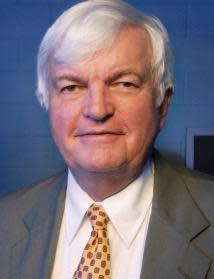Douglas Neckers: If only we spent more time thinking of the legacy we'll leave
Well, it happened to me, despite all my precautions: COVID-19. I had been traveling overseas on a long anticipated vacation; and I got sick. I had gotten my shots and my boosters, and as a result, I thought I was pretty safe.
So when I started to feel totally exhausted, I didn’t know why, or what that was from. In other words, I was naïve, which is a little embarrassing for a professional scientist. Or maybe not; the symptoms at the onset of COVID vary, and aren’t widely known. Then, when I finally came home, I went to my local doctor and got to hear him say (in so many words) how dumb I had been.
Neither my partner nor I had thought this was COVID, but that’s indeed what it was. Thanks to the virus, both of our vacations were ruined, I have joined the other 97.2 million Americans who have been diagnosed with the virus, and I have begun a long period of recovery. There’s little else to say about this except … even in the case of the milder variants, COVID is bad, period.

But that’s not my focus today. Instead, this column was inspired by something I saw in The Sentinel newspaper last week that said, “religion’s a good idea; you ought to try it.”
That touched a nerve. I knew I didn’t have the physiological strength to go to church, so I started looking around for streaming events at Episcopal churches in Ohio. Today, Trinity Cathedral Cleveland worshiped with a choral evensong. The scripture was 1 Corinthians 13 (Paul’s epistle about love) and the music chosen was appropriate and pertinent beyond belief
The arrangement was that of the great organist and choirmaster Larry King (no relation to the talk show host) whose career included stops at Westminster Abbey and the Cathedral of St. John the Divine in New York City.
The title was “Let Us Love In Deed And Truth,” and the lyrics were these:
“If anyone has the world’s goods and sees his neighbor in need,
Yet closes his heart against him, how does God’s love abide in him?
Let us not love in word or speech, but in deed and in truth.
By this we shall know that we are of the truth.
We have confidence before our God and we receive from him whatever
We ask, because we keep his commandments and do what pleases him.
Let us not love in word or speech, but in deed and in truth.
Stirring words indeed. Perhaps it wouldn’t be a bad idea if some of our vicious politicians would try religion and church for a change. St. Paul said “Though I speak with the tongues of men and of angels, and have not charity, I am become as sounding brass, or a tinkling cymbal.
“And though I have the gift of prophecy, and understand all mysteries, and all knowledge; and though I have all faith, so that I could remove mountains, and have not charity, I am nothing.
“And though I bestow all my goods to feed the poor, and though I give my body to be burned, and have not charity, it profiteth me nothing.
“When I was a child, I spake as a child, I understood as a child, I thought as a child: but when I became a man, I put away childish things.
“For now we see through a glass, darkly; but then face to face: now I know in part; but then shall I know even as also I am known.
“And now abideth faith, hope, charity, these three; but the greatest of these is charity.”
Larry King tragically died in 1990, a few months after he finished this amazing work, yet his memory remains through his words and his song. St. Paul, of course, wrote nearly 2,000 years ago, and his words endure.
But do you think a single politician proffering bitter and angry ideas will leave his or her name on any marker lasting for centuries?
Perhaps were they to consider what they leave behind when they abandon religion and a philosophy that means, love, hope, charity and faith, their legacies might be different. They might instead leave more of a long-lasting, positive imprint, and be remembered more like those of the Good Samaritan, and less like those selfish beings who attempt to accumulate power and store up the riches of earth, and then die, to be all-to-soon as forgotten as their dust.
— Douglas Neckers is an organic chemist, the McMaster distinguished professor emeritus and the founder of the Center for Photochemical Sciences at Bowling Green State University, and a former chair of the Robert H. Jackson Center in Jamestown, N.Y.
This article originally appeared on The Holland Sentinel: Douglas Neckers: If only we spent more time thinking of the legacy we'll leave
